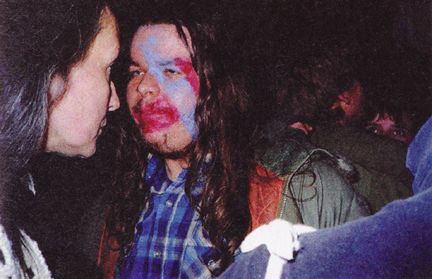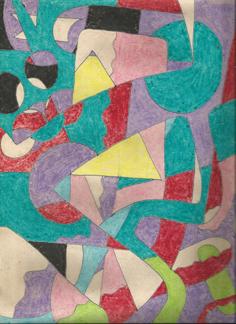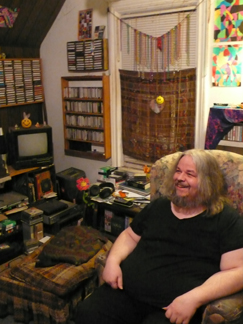Everyone Knew Him as Nancy: Richard Wright and the Old, Weird Phish

Inside Richard Wright, there was a demon and there was Nancy. He’d sort of known he was Nancy all along, but the demon was different. In September 1982, when Wright was 18, he arrived in Vermont from Maryland, where he’d grown up, and enrolled at Goddard College, a tiny experimental institution outside Montpelier.
“Over a period of time, I began to feel that my legal name was not my real name,” he recalled recently. “I was starting to feel that I had a natural name, a name that my soul actually has, and I decided after a while that that my name was Nancy. By wearing that name proudly, it was also like being blatant about my feminine side.” He wore dresses. He convinced his peers at Goddard to address him by his new name.
Until the demon came, there was little in to fit into. The on-campus enrollment had dwindled to around three dozen, each pursuing his or her own self-evaluated course of study. “My first semester there, I was just sort of lost, not really sure what to do,” Wright says. He wrote papers about King Crimson and Yes albums and hosted an all-night radio show on WGDR, midnight to 7 a.m. But name change notwithstanding, he was still looking for his own particular path in early 1985 when the radio station acquired its own Fostex four-track.
“You could always find some place to play and not be obnoxious and annoy people,” remembers Jim Pollock, a graphic artist who signed out the Fostex on occasion and ogled Nancy’s massive LP collection. “There was barely anyone on campus.” One evening in the spring, Pollock played some of his recordings for Nancy, and everything clicked.
Nancy had taken acid that night. “After I left Jim’s room and went back to my own dorm, that’s when I started freaking out,” he recalled of his bad trip. “That’s when this spirit invaded my system.”
And soon thereafter, he borrowed the Fostex for himself. The first song came almost miraculously in seven-part barbershop harmony, which Nancy recorded by slowing down and speeding up his voice over a skeletal rhythmic click. His father had sung barbershop. Nancy knew a little piano, and had sung in church choirs, too, during a teenage dalliance with born-again Christianity. He loved The Beach Boys.
“It felt like I had this incredible resource attached to me that I could draw from, but I felt like it was drawing something out of me,” he says of the demon. For a little while, though, he drew from it, as well as all-night stream-of-consciousness journal sessions, inspired by Patti Smith. “Kool-Aid silver tooth broke my sunny shoe-shine and all my plastic melon dreams are waitin’ for their new shine,” he sang on the barbershop song he made up, which he called “I Didn’t Know.”
The next tune came a few months later with an incessant hand-drum groove but was likewise a cappella and even more complex. There was a mutated doo-wop bassline, but other than that, it didn’t belong to any particular musical tradition, both ambitious and natural in its arrangement of bridges, mini-choruses, and hook after hook. “What is the central theme to this everlasting spoof?” he asked in one of the song’s many vocal parts. He thought of Motown and Brian Eno and called the song “Halley’s Comet.”
He played the songs for his friends around campus, and they got occasional spins on WGDR where they became local hits, in a way. “There was no entertainment!” Jim Pollock remembers of life at Goddard. “Because of the way the mountains are there, you don’t get many radio stations, and so you are broadcasting to a bunch of people. There was no cable in Vermont. Unless you’re in a certain place, you’re only receiving a handful of television or radio stations, so you become the only game in town.” The tapes got passed around campus, too. “Those were very well-known songs, even around Plainfield,” Pollock says of the college town.
One person who heard them was an affable guy who’d recently transferred in from Southern Methodist University in Texas. Nancy had seen him playing Traffic covers on the piano in the Haybarn, where people hung out. Page McConnell played with the R&B group Love Goat and hosted a WGDR show with Pollock. He’d just joined Phish, too, a UVM band that played at Goddard’s spring fling. Nancy skipped the show. He didn’t like loud music or crowds. McConnell played him a tape. Nancy was impressed. He thought it sounded like Yes.

Over Halloween, Phish was booked to play in the Sculpture Building, a student-designed structure that included catwalks and spires. The band’s guitarist introduced himself to Nancy.
“Are you Nancy?” the guitarist asked him.
“Are you the guitarist who sounds like Frank Zappa?” Nancy inquired.
Trey Anastasio laughed. Phish had recently debuted a cover of Pollock’s “Dear Mrs. Reagan,” and Anastasio asked Nancy if they might cover “Halley’s Comet.”
Nancy didn’t see Phish perform that night. He had his own business. The demon had gotten bad. “It just didn’t feel right,” he recalls. “It was stealing my energy, and causing me to steal energy from other people, and I just didn’t like being in that position.” Dressed in a green monster mask and green monster gloves, Nancy went back to his room and listened to the recording of a musical exorcism he’d DJed on his radio show.
Phish didn’t play anyway. The LSD-spiked apple cider they drank had come on too strong and, as Nancy flushed the evil spirit from his body, across campus, Phish freaked out.
“It was like being part of a secret society or something, being culturally off the grid,” remembers Phish bassist Mike Gordon, the only band member who didn’t transfer in to Goddard soon thereafter. McConnell received $50 per head for recruiting of Anastasio and drummer Jon Fishman. “Everyone there was self-structuring their educations, and into unique stuff,” Gordon says. “There was Bruce Burgess, who was doing poetry, and who could only speak in poetry and not in English, as far as I was concerned. One thing they told me early on about Nancy was that he was hydrophobic. He didn’t like water at all. He always had that kind of look, unfettered by cleaning fluids that rob most of us of our natural oils.”
Though he’d found his path in music, Nancy wasn’t enrolled any longer. “I’d gotten to a point where I didn’t trust any of the faculty or staff at Goddard, so I wouldn’t talk to any of them. I didn’t care if I got college credit or not, I just wanted to be there and use the resources they had there. And they were like, ‘You can’t be here if you don’t care about college credit.’” He hung around anyway.
On the earliest known Phish recordings of “Halley’s Comet,” taped at an April 1986 show in the Haybarn, there is an audible cheer as the song begins: already a hit. The band arranged Nancy’s layered vocals for themselves, with Gordon singing and playing two separate basslines. They picked up new skills in the process, and the song’s inherent strangeness – a perfect musical expression of its author – reinforced the band’s growing identity as a product of the deepest, weirdest Vermont. Often, Nancy himself would join the band to sing the song.
“Musically, I was really inspired by the Nancy stuff,” Gordon says. “‘Halley’s Comet’ had this incessant groove to it. People should hear the original version, because I don’t think we ever quite did justice to it. It’s just the way the bongo just starts and goes and goes and goes and goes, and another verse and another chorus, and whistling and singing. People’s four-track tapes maybe often turn out like that, but this one never lost interest to me as it kept going. Somehow, he made this bongo groove that was really convincing for me.”
Not long after they debuted “Halley’s Comet,” Nancy – somewhat audaciously, no doubt – wrote a new song for Phish to cover titled “Snootable Snunshine.” More than 12 minutes of woozy keyboards, complex drum fills and nonsense lyrics, the song contained a surprisingly innate sense of the band’s early compositional whimsy, sounding like a lost, lo-fi Phish classic. Anastasio and Fishman fell into hysterics after hearing it.
Nancy became friends with the band and a regular at shows. In 1987, Phish added “I Didn’t Know” to their setlist, as well – the band’s first foray into barbershop – and something they could perform without Nancy. And when Phish left Vermont, they brought Nancy’s songs with them. “I Didn’t Know” remained a staple, even more so when Fishman introduced a show-stopping vacuum solo to it – which, in retrospect, may have distracted from the vocal arrangements and lyrics.
Nancy accumulated recordings and sold a tape or two, but mostly just kept circulating them by hand. He never performed live. How could he possibly recreate the multi-part vocal cover of Frank Zappa’s “Peaches En Regalia” he’d done? Or “Super-Delicious Crunchy Forest Critters,” a 14-minute exercise in layered, wordless vocals, pitch-twisted into a Frippertronic wonderland. “The Formidible Poseur” layered distorted keyboards into a wild drone. “Silver Flu” continued the barbershop streak, a tribute to The Fugs’ “Supergirl.” “Passive/Aggressive,” played on an open-tuned acoustic guitar," nailed “If I Needed Someone” -era George Harrison to a tee.
In 1990, around the time that Fishman finally completed his graduation requirements, Nancy realized that he was no longer Nancy. “I met a psychic who told me Nancy was the name of a lover I had in a past life,” he says. He was Richard again.

“There’s a picture of The Green Hornet and Kato on the door,” read the directions. “NOT the recent movie version, but the ‘60s TV version, with Van Williams and Bruce Lee.” A sign over the hallway requests that entrants do not use cell phones. And, at the apartment’s chillest, deepest center, the words “F A R O U T,” spelled out on the slanted ceiling, peering down over a lava lamp, turntable, stacks of books, and what remains a totally sweet LP collection.
Richard Wright stopped seeing Phish around 1989. "Their sound had started to change. They got tighter, a little bit slick, but the main problem for me was that they were getting too popular. There were too many people at the shows, so they had to play bigger and bigger places, and the places got more and more packed, and they were playing louder, and I became overwhelmed by it. I couldn’t really deal after a while.
“Without selling out or going mainstream, I think they wanted to be as successful as they could be. I found it more interesting when they were a bit more sloppy or experimental or going out of their way to prove themselves. When it became like an actual rock band onstage in a concert hall, all of a sudden, I didn’t feel like I was just hanging out with my friends anymore, and I felt like I was at a rock concert. And I don’t really like being at a rock concert. It’s hard for me to enjoy the music at a rock concert.”
He caught them when they played at the Flynn Theater in Burlington in 1997, but thought that they were phoning it in. He caught them again in 2004, and enjoyed it more, though he hasn’t been back. He hasn’t spoken to anyone in the band since then, either.
“I know whenever they play one of my songs,” he laughs, a giggle that picks up steam into a deep cosmic cackle. The royalty checks have arrived more regularly since the establishment of the band’s LivePhish.com. His television is small and the seats in the room are positioned optimally for listening on any of the multiple sets of speakers, including a smaller set for after the next-door neighbor goes to sleep. Wright doesn’t own a car, phone – cellular or otherwise – and uses email at the public library.
His gear is in one corner of the room: a Danelectro electric guitar, a drum machine and a Casio keyboard that first hit shelves in 1985, the same year that Wright briefly tried to sell one of his tapes, A Boy and His Goddess, with the name Nancy written on the spine in Viking runes. Since the ‘80s, he has continued to record on a four-track under various names: Blue Whale, Nigel, Sea Creature, Manta Ray, but most lately, Dick Facebat, where one can also find him on Facebook.
His recordings of “Halley’s Comet” and “I Didn’t Know” appeared on a bonus disc that came with the first edition of The Phish Companion, but most of his music remains unreleased. Recently, his friend Rael played some of his recordings in a Phish room on the user-managed turntable.fm website. “All of them got rejected,” he says, the giggle turning to cosmic cackle again. “All of them.”
Indeed, Nancy’s music perhaps more properly belongs to a lineage of home experimenters and avant-garde pop musicians than to the jamband scene. Nonetheless, there his songs are, lodged deep in the genetic code of the Vermont quartet, and beyond.
“For me, it was this feeling of going to Goddard,” reflects Mike Gordon of Nancy’s music. "It was just really special. You’re nestled away from the normal institutional life of a big college or all the other institutions in our lives. I liked to play Nancy’s tape for people in that same sort of context, where there’s not usually too much to do, maybe at some sort of tucked- away place in the middle of the night. I thought, compared to that experience, that our versions didn’t really do justice. But whether we did justice to ‘Halley’s Comet’ or not, I think our version stemmed from an emotion, not really of the comet itself, or the songwriter, or even the people playing, in a sense.
“I think it’s a lot subtler than the Grateful Dead coming from the whole psychedelic era or Fela Kuti coming from the political turmoil of Nigeria and having a little Mecca in the middle of all the killing. This was a lot subtler but I think it was important – this Nancy tape, the way he acted, the way that he looked kind of created this emotional backdrop and this cultural backdrop that we borrowed from. It made the band what it is.”
Which is to say: Jon Fishman wasn’t the first dress-wearing acidhead in the Northeast Kingdom. “I still haven’t found my real name,” Wright says, “which is mostly why I still go by legal name. I still feel that in some of my past incarnations, I was a woman.” Unencumbered by modern culture’s rush, he continues to work slowly at home, far away in the old, weird Vermont.
Thank you to WFMU, the listener-supported freeform radio station in Jersey City, N.J. that preserved Nancy’s hand-labeled A Boy and His Goddess cassette in their tape archive for over 20 years, and to DJ Dan Bodah for discovering it and recognizing its awesomeness, if not its origins. Please support WFMU.




















